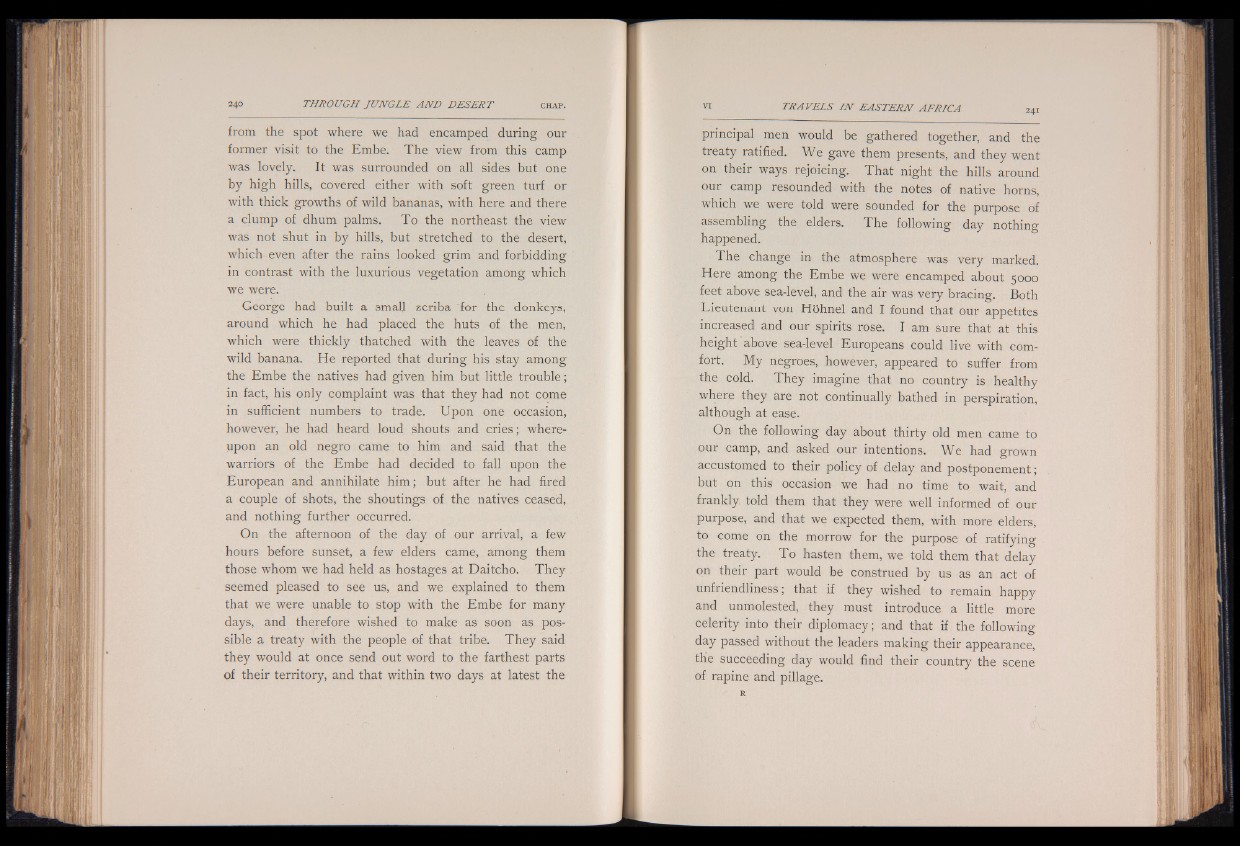
from the spot where we had encamped during our
former visit to the Embe. The view from this camp
was lovely. It was surrounded on all sides but one
by high hills, covered either with soft green turf or
with thick growths of wild bananas, with here and there
a clump of dhum palms. To the northeast the view
was not shut in by hills, but stretched to the desert,
which even after the rains looked ogr im and forbiddinog
in contrast with the luxurious vegetation among which
we were.
George had built a smalj zeriba for the donkeys,
around which he had placed the huts of the men,
which were thickly thatched with the leaves of the
wild banana. He reported that during his stay among
the Embe the natives had given him but little trouble;
in fact, his only complaint was that they had not come
in sufficient numbers to trade. Upon one occasion,
however, he had heard loud shouts and cries; whereupon
an old negro came to him and said that the
warriors of the Embe had decided to fall upon the
European and annihilate him; but after he had fired
a couple of shots, the shoutings of the natives ceased,
and nothing further occurred.
On the afternoon of the day of our arrival, a few
hours before sunset, a few elders came, among them
those whom we had held as hostages at Daitcho. They
seemed pleased to see us, and we explained to them
that we were unable to stop with the Embe for many
days, and therefore wished to make as soon as possible
a treaty with the people of that tribe. They said
they would at once send out word to the farthest parts
of their territory, and that within two days at latest the
principal men would be gathered together, and the
treaty ratified. We gave them presents, and they went
on their ways rejoicing. That night the hills around
our camp resounded with the notes of native horns,
which we were told were sounded for the purpose of
assembling the elders. The following day nothing
happened.
The change in the atmosphere was very marked.
Here among the Embe we were encamped about 5000
feet above sea-level, and the air was very bracing. Both
Lieutenant von Hohnel and I found that our appetites
increased and our spirits rose. I am sure that at this
height above sea-level Europeans could live with comfort.
My negroes, however, appeared to suffer from
the cold. They imagine that no country is healthy
where they are not continually bathed in perspiration,
although at ease.
On the following day about thirty old men came to
our camp, and asked our intentions. We had grown
accustomed to their policy of delay and postponement;
but on this occasion we had no time to wait, and
frankly told them that they were well informed of our
purpose, and that we expected them, with more elders,
to come on the morrow for the purpose of ratifying
the treaty. To hasten them, we told them that delay
on their part would be construed by us as an act of
unfriendliness; that if they wished to remain happy
and unmolested, they must introduce a little more
celerity into their diplomacy; and that if the following
day passed without the leaders making their appearance,
the succeeding day would find their country the scene
of rapine and pillage.